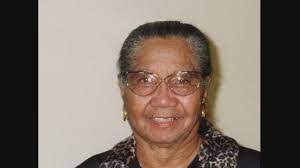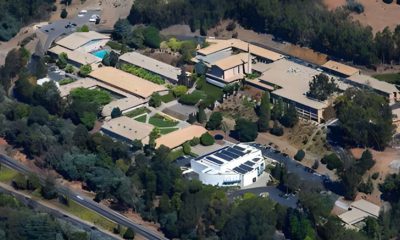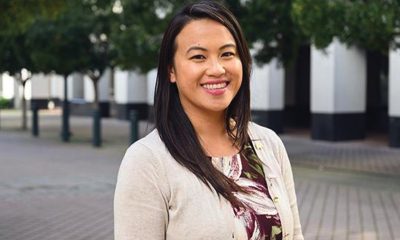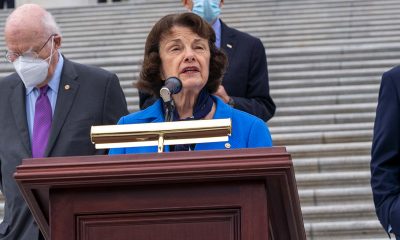Community
SF Chronicle’s New Editor-in-Chief Audrey Cooper, In A League Of Her Own
San Francisco – When you are passionate about your job, the day goes by fast.
You lose track of the time because you are knee deep in work. All the different projects, deadlines and requests can pull a person in different directions and can stress you out.
But not this woman. She was doing her job – an exemplary job – and she had no idea that there would be such an enthusiastic response when her promotion was announced.
“I was really surprised by the amount of attention my promotion got because of my gender and age,” Audrey Cooper said. “I told my husband on the day it was going to be announced that I might be home early because I don’t think anyone is going to care. I’ve been really humbled by the response.”
Cooper is the first woman to fill the role as editor-in-chief of the San Francisco Chronicle in the company’s 150-year history. She is also the youngest woman ever named as the top editor of a major U.S. newspaper company.
Cooper changed what is considered the normal for the news industry. She was promoted each year, starting in 2012.
As the managing editor, she raised the bar on many fronts. She was the driving force to investigate the mismanaged reconstruction of the Bay Bridge back in 2011.
The newspaper’s reporting led to the opening of the new bridge on September 2, 2013. The in-depth research that her newsroom accomplished has been phenomenal.
“The Bay Bridge and PG&E were the most challenging breaking news projects yet – but it was all for the people,” she explained.
Her dedication to challenge the status quo and push the envelope, led to the SF Chronicle being a finalist for the Pulitzer Prize in 2014 under Cooper’s leadership.
In that same year, she also started an in-house incubator project to transform the newsroom into a digitally focused operation that has successfully developed new storytelling techniques.
“I tell people all the time, I don’t read it in print first, I read it online,” Cooper said. “As long as people read the news, my job is done. Professional journalism is worth paying attention to. I work around the clock in order to make sure that happens.”
Cooper also continues to make time for the community, whether it is fighting a cause, raising money for the youth or exposing a leak in order to develop a better environment.
She is an editor-in-chief that feels that if she is part of the community, then the SF Chronicle is part of the community.
Because of her passion for the community, Cooper finds ways to be involved. A multimedia series on “Gentrification” in San Francisco’s Mission District is the current project.
In fact, right after speaking at Watermark’s first Women’s Conference held last month in Santa Clara, she headed over to the Mission District in the city to speak to about 300 people in the community.
“Everything we do is for the people – there is nothing more important than the community in which we live,” Cooper said. “There’s no limit to how much better we can be at the Chronicle. We will always strive to be the best.”
California Black Media
Gov. Newsom Goes to Washington to Advocate for California Priorities
Gov. Gavin Newsom traveled to Washington, D.C., for meetings with senior Biden-Harris Administration officials and members of California’s congressional delegation. During the week, he pushed for increased resources to improve public safety and quality of life in California.

By Bo Tefu, California Black Media
Gov. Gavin Newsom traveled to Washington, D.C., for meetings with senior Biden-Harris Administration officials and members of California’s congressional delegation.
During the week, he pushed for increased resources to improve public safety and quality of life in California.
“California is continuing our work to secure additional tools and resources to improve access to health care, clean air and water, and secure critical funding to support communities recovering from disasters,” said Newsom.
At the White House, Newsom met with President Joe Biden and key officials, advocating for disaster relief funding, healthcare expansion, and environmental protection. He also engaged in discussions with senior Biden-Harris officials, including Interior Secretary Deb Haaland, to address water quality improvements and the San Luis Dam project, which will support water supplies for two million Californians.
“Building on our strong partnership with the Biden-Harris Administration, California is working closely with the White House over the next two months to deliver the critical protections and resources our communities need,” Newsom said.
On Capitol Hill, Newsom met with California Senators Alex Padilla and Adam Schiff, along with other Congressional leaders, to emphasize the need to approve pending disaster funding, healthcare programs, and environmental protections. He also previewed California’s upcoming special session to proactively address potential federal challenges when President-elect Donald Trump is sworn into office.
Newsom’s discussions also focused on securing Medicaid waivers from the Center for Medicare & Medicaid Services (CMS) to enhance behavioral health services and reduce homelessness. The state seeks approval for the BH-CONNECT waiver, which would address behavioral health and homelessness, and the MCO Tax Waiver, which would provide over $20 billion for Medi-Cal to improve healthcare access.
Additionally, California is pushing for Clean Air Act waivers from the U.S. Environmental Protection Agency (EPA), which are crucial for enforcing air quality regulations. These measures are projected to prevent 11,000 premature deaths and provide $116 billion in health benefits over the next three decades, according to the Governor’s office.
California Black Media
California to Offer $43.7 Million in Federal Grants to Combat Hate Crimes
Gov. Gavin Newsom has announced that 311 California nonprofit and faith-based organizations, including those representing communities targeted by hate crimes, will receive over $43.7 million in federal funding through the Nonprofit Security Grant Program. The funding aims to enhance security measures such as reinforced doors, access control systems, and lighting to protect against hate-based violence.

By Bo Tefu, California Black Media
Gov. Gavin Newsom has announced that 311 California nonprofit and faith-based organizations, including those representing communities targeted by hate crimes, will receive over $43.7 million in federal funding through the Nonprofit Security Grant Program.
The funding aims to enhance security measures such as reinforced doors, access control systems, and lighting to protect against hate-based violence.
“An attack against any community is an attack against our entire state and our values. We will protect the ability of every Californian to worship, love, and gather safely without fear of hate or violent attacks. California is continuing to safeguard all communities, including those most at risk,” said Newsom.
California receives 10% of the national allocation, the highest of any state. This funding comes in addition to $76 million in state funding for similar security improvements announced in July 2024. In total, California has invested over $230 million since 2015 to safeguard vulnerable communities.
“California is dedicated to helping our communities stay safe from violent hate crimes and get access to essential financial funding to support those efforts,” said Cal Office of Emergency Services (OES) Director Nancy Ward.
The grants are particularly important as hate crimes, especially against Jewish, Muslim, LGBTQ+, and Black communities, have seen an increase. In response, California has also launched initiatives like the CA vs Hate hotline and website, providing a platform for reporting hate incidents anonymously. Newsom’s administration continues to prioritize the safety of all Californians, with ongoing efforts to combat discrimination and hate violence.
California Black Media
California Reports First Case of Mpox in the United States
On Nov. 16, the California Department of Public Health (CDPH), reported the first known case of clade 1 Mpox, previously known as Monkeypox, in the United States. However, the risk to the public remains low, according to the CDPH.

By Bo Tefu, California Black Media
On Nov. 16, the California Department of Public Health (CDPH), reported the first known case of clade 1 Mpox, previously known as Monkeypox, in the United States.
However, the risk to the public remains low, according to the CDPH.
“This case was confirmed in an individual who recently traveled from Africa and is related to the ongoing outbreak of clade I mpox in Central and Eastern Africa,” reads a statement the CDPH released.
According to the DDPH, “The affected individual received health care in San Mateo County based on their travel history and symptoms. The individual is isolating at home and recovering.”
Public health workers are also conducting a contact tracing exercise and reaching out to people who have been in close proximity to the affected person.
“The mpox specimens from the traveler are being sent to the CDC for further laboratory testing,” the CDPH press release continues.
Californians can take a number of steps to prevent Mpox. Here’s more information:
Preventing Mpox Infection
It appears clade I mpox spreads in a similar manner as clade II mpox, through close (skin-skin), intimate and sexual contact. The identification of a potentially more severe mpox version in the United States is a good reminder for individuals who have certain risk factors to take preventive action, including:
- Getting vaccinated if you may be at risk for mpox. For the greatest protection, make sure you get both doses of the vaccine. Find mpox vaccine (JYNNEOS) near you.
- Taking precautions if you were exposed to mpox. Get the mpox vaccine before symptoms develop and consider avoiding intimate contact with others for 21 days. Watch yourself for symptoms and get tested if they develop.
- Preventing spread if you have been told you have mpox. Avoid contact with others until the rash is healed, clean and disinfect shared areas in the home, and notify people who may have been exposed.
- Talking to your sexual partner(s).
- Avoiding skin-to-skin contact with those who have a rash or sores that look like mpox.
- Not sharing items with someone who has mpox.
- Washing your hands often.
- Protecting yourself when caring for someone with mpox by using masks, gowns and gloves.
Visit the CDPH website to learn more about Mpox with Sexual Health Toolkits and a Campaign Materials Page.
-

 Alameda County4 weeks ago
Alameda County4 weeks agoAlameda County District Attorney Pamela Price Announces $7.5 Million Settlement Agreement with Walmart
-

 Activism3 weeks ago
Activism3 weeks ago‘Jim Crow Was and Remains Real in Alameda County (and) It Is What We Are Challenging and Trying to Fix Every Day,’ Says D.A. Pamela Price
-

 Bay Area4 weeks ago
Bay Area4 weeks agoIn the City Attorney Race, Ryan Richardson Is Better for Oakland
-

 Activism4 weeks ago
Activism4 weeks agoOakland Post: Week of October 30 – November 5, 2024
-

 Alameda County3 weeks ago
Alameda County3 weeks agoD.A. Price Charges Coliseum Flea Market Vendors in Organized Retail Theft Case
-

 Activism3 weeks ago
Activism3 weeks ago‘Criminal Justice Reform Is the Signature Civil Rights Issue of Our Time,’ says D.A. Pamela Price
-

 Activism2 weeks ago
Activism2 weeks agoLIVE! — TOWN HALL ON RACISM AND ITS IMPACT — THURS. 11.14.24 5PM PST
-

 Activism4 weeks ago
Activism4 weeks ago“Two things can be true at once.” An Afro-Latina Voter Weighs in on Identity and Politics




















































